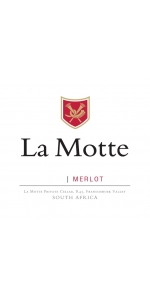Wine from La Motte

The La Motte Estate
Situated in the beautiful Franschhoek Valley in South Africa’s Cape winelands, La Motte is home to some of South Africa’s finest wines, recognized internationally for their exceptional quality. In harmony with the production of wines, La Motte has also ventured into flower cultivation and the production of ethereal oils. True to its philosophy of a culture of excellence, La Motte maintains a programme of consistent quality improvement, reaching beyond wine production. The estate has a strong commitment to historic and cultural preservation, as well as the active socio-economic upliftment of its workers and their families. With its picturesque setting, historic buildings and rural atmosphere, La Motte is an enchanting destination for visitors to the winelands of the Cape.
La Motte is synonymous with the highest quality in wines. To carry the La Motte label, each wine has to reflect the greatest expertise in viticulture, combined with experience, passion and a creative flair in wine-making.
Annually a total of 1 000 tons of grapes are processed in La Motte's modern cellars, where old-world wine-making methods are combined with state-of-the-art technology.
History:
In 1695 a piece of land in the Franschhoek Valley was granted to German immigrant Hans Hattingh. In 1709 French Huguenot Pierre Joubert purchased the land and named it after the village of his birth in Provence, La Motte d’Aigues. With the planting of 4 000 vines in 1752, viticulture was established on La Motte by Huguenot descendant Gabriel du Toit. The farm passed through several owners before being acquired by the Rupert family in 1970.
Today, La Motte owner Hanneli Rupert-Koegelenberg and her husband Hein Koegelenberg, CEO of La Motte, oversee La Motte’s making of exceptional wines as well as diversifying La Motte's operations into flower and ethereal oil farming.
The La Motte Vineyards
The unique charm of La Motte’s wines can be attributed to particular soil types, a moderate climate as well as a team of dedicated experts who keep abreast of international viticultural and vinicultural practices.
Viticulturist Pietie le Roux, who majored in viticulture, viniculture and pomology at South Africa’s leading agricultural training institution, has been in charge of La Motte’s vineyards since 1986, assisted by a highly motivated workforce.
“Fine grapes make fine wines”, says Pietie, “therefore we constantly try to improve our harvest results and apply findings obtained from ongoing research and developments in viticulture”.
The most modern practices are employed in the selection of vineyard sites, rootstock and clones, grape varieties planted, vineyard facings and vine spacing. Through extra high trellis poles, a bigger canopy of leaves is created, allowing more leaves to absorb the sunshine, enhancing early ripening and the formation of prominent aromas. The bigger canopy also protects the grapes against direct sunshine. Vine growth is restricted, to limit grape size and promote a high-quality extract, ideal for the production of elegant, complex wines.
These practices are further refined by the precision of science. The latest technology is applied, including GIS (Geographical Information Systems), by which the farm is scanned by satellite, monitoring and controlling the effects of slopes, radiation, micro and macro climates and soil classification.
Through infrared scanning, vine conditions such as stress and irrigation demands can be pinpointed by vineyard block in order to be addressed accurately. In specified vineyards on the La Motte Nabot farm in the Walker Bay region – from where grapes for La Motte wines are obtained – SGS-certified organic farming is practised, totally eliminating the use of chemicals and insecticides, thus promoting health benefits.
Furthermore, La Motte is equipped with a weather station and temperature monitoring system – loggers in vineyards determine humidity, moist conditions and temperatures in zones where grape bunches are formed.
Conscious of the effects of agriculture on the natural habitat, La Motte is accredited to the Biodiversity & Wine Initiative (BWI), a partnership between the South African wine industry and the conservation sector. The objective is to help keep biodiversity intact so that species and ecosystems are able to adapt to changes in the environment and to recover more readily from disturbances in their natural growth system.
Grapes are sourced from the Elgin (34%), Franschhoek (20%), Walker Bay (20%), Nieuwoudtville (9%), Darling and West Coast (8%), Durbanville (5%) and Elim (4%).
Grapes from Franschhoek and Walker Bay are organically grown.
La Motte Merlot is made from 100 percent Merlot.
La Motte Merlot offers a bouquet of red currants, cherries and spicy oakiness. It is an elegant, well-balanced and juicy wine with an underlying, refreshing quality.
Excellent with lamb, roasts or casseroles.
Review:
"Medium garnet color. Aromas and flavors of smoked meat, toast, leather, grilled plum, baked cherry tart, cracked black pepper, and myrrh with a round, lively, dry medium body and a smooth, interesting, medium-long finish with notes of chocolate-covered pecans with well-integrated, fine, firm tannins and light oak flavor. A savory and juicy Merlot with a strong sense of place; try with most meat dishes."
- Beverage Testing Institute (April 2021), 90 pts
- back
Selected Options
Wineries
Categories
Pricing
Countries
Regions
Grape Types
Wineries
Organic/Free Shipping
In 1996, building on their tradition of excellence established at Duckhorn Vineyards, and their growing love of Pinot Noir, Dan and Margaret Duckhorn came to Anderson Valley to found Goldeneye. Anderson Valley has since earned acclaim as one of the world’s greatest Pinot Noir regions. Representing the pinnacle of our winemaking portfolio, Ten Degrees is made from only our finest lots, making it a Pinot Noir of unparalleled grace and grandeur.
Reviews:
From the best lots on the Golden- eye Estate, this wine aged in French oak for 16 months. Scents of wild cherry and sage are off the charts. Undeniable vibrancy, generous fruit, and floral notes create a mael- strom of flavor and texture that complements the wine's intensely high energy. Earthy, salty notes manifest in a kiss of soil, balsamic, cinnamon, and cedar.
-Tasting Panel 96 Points
A beautiful blend of the best barrels of all the single vineyards and it shows wonderful complexity and thoughtfulness. Layered and complete, giving you so much flavor and deliciousness.
-James Suckling 96 Points
Schramsberg Brut Rosé is fruitful, complex and dry, making it both versatile with food and delicious by itself as an apéritif. The character of the wine is most strongly influenced by bright, flavorful Pinot Noir grown along the coast from southern Mendocino County to northern Marin County.
Reviews:
"These bubbles are fresh and zesty, with aromas of strawberry, raspberry, apricot, orange creamsicle and blood orange zest on the nose. Creamy, super-firm and tiny bubbles mark the midpalate, while flavors of pink grapefruit and guava overtake the mouthfeel. The massive acidity, salinity and mouthwatering finish make one want to eat and drink more."
-Wine Enthusiast 94 Points





